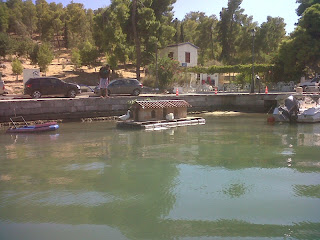2012 12 10
Boring Old London Ontario
An interesting article in The Independent, a UK newspaper, discusses the changes that are occurring in the location of magnetic north.
http://www.independent.co.uk/news/science/adjust-your-compass-now-the-north-pole-is-migrating-to-russia-2233610.html
 |
| Migratory Birds Lost on Their Way Home |
The correction changes depending on where the sailor is and every year the amount of the change varies. It is not as complicated as it sounds but it is about to get a lot harder.
 |
| The information underlined says "004 1/2°W 1985 (8'E)" It means Magnetic Variation was 4 1/2° in 1985 and changed by 8'E annually. BUT that was in 1985. |
The speed of change of the location of magnetic north is increasing at near alarming rates. After decades of being virtually stationary the location of magnetic north is hurtling toward Russia.
Just now Magnetic North is understood by most scientists to reside somewhere off Ellesmere Island in Canada's far north. Racing towards Russia at about 40 miles a year, faster than any time in recorded history it will not be long before magnetic north becomes the property of Russia.
So what. Big Deal. Let Russia pay to maintain the bloody magnetic north pole. About time the Canadian Taxpayer might yell.
 |
| Tower this is Gulf Hotel on Final to Runway two eight. No make that two five. No, no, it is two two Yes, that's it. Two two, give or take two or three |
At Miami the change in magnetic North is so large they have to renumber the runways.
NOAA, the American hydrographic and weather agency, publish cool calculators that many of us use to figure out declination. This very month, NOAA has removed all their calculators from their website and have published new ones.
According to the Independent some smart people fear that he magnetic poles will flip: north will become south and vice versa. These people are not worried that the poles will flip in a few million years. If their fears prove out the big flip could happen now. Right now.
Should you be worried?
The government is not telling you about this problem. What does that do for your comfort level?
For my part I am taking Chinese lessons.

































